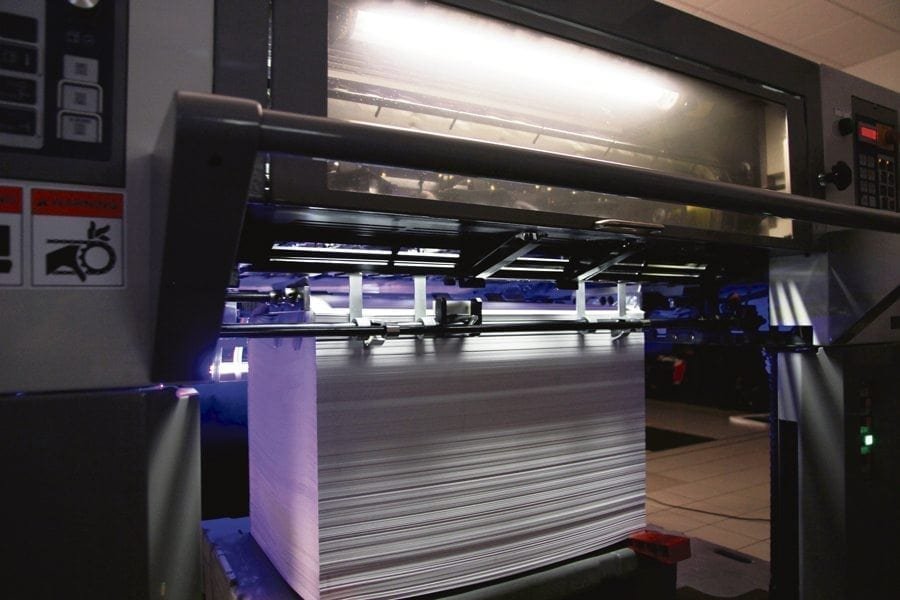The printing industry has witnessed some seismic shifts since Gutenberg invented the printing press in the 15th century; while once wooden letters were hand-set and rolled with ink before being pressed against sheets of paper, today’s printers use metal plates that don’t come into contact with paper at all.
But technological advances in the industry have brought new environmental threats; offset lithography – the technique used by the vast majority of printing companies – consumes significant natural resources, sends masses of waste to landfill and generates volatile organic compounds (VOCs) which, when released into the atmosphere, have a detrimental effect on the air we breathe.
For the offset lithographic process to work, Isopropyl Alcohol (IPA) or similar substitutes are used to break the surface tension of the water. This nasty chemical emits VOCs and pollutes the huge volumes of fresh water that are also used in the process.
The result? The seemingly straightforward task of getting ink on paper has created the world’s fourth-largest manufacturing industry – and its fifth-worst environmental offender.
Waterless printing
 Back in 1996, Seacourt – now an award-winning environmental printing company in Oxford – discovered just how damaging the industry was. Its owners made the decision to look at how the company’s processes could be managed and its environmental impact reduced.
Back in 1996, Seacourt – now an award-winning environmental printing company in Oxford – discovered just how damaging the industry was. Its owners made the decision to look at how the company’s processes could be managed and its environmental impact reduced.
For Seacourt, the largest single change has been the shift to waterless printing. This, according to the company’s managing director, Gareth Dinnage, is ‘THE environmental print route’.
Waterless printing follows exactly the same process as offset lithography, but without using or polluting fresh, finite water. In fact, working with silicone-coated plates means Seacourt doesn’t need to use any water – or dangerous chemicals – in the printing process at all.
The business is now saving the equivalent of a small lake of water each year, plus an additional 135,000 litres a year thanks to the water recycling unit on its plate processor. ‘The switch to waterless printing immediately enabled us to reduce our VOC emissions by 98%’, Gareth told PQ. ‘Since we implemented this technology we’ve saved 7.5 million litres of valuable fresh water.’
LED drying
Waterless is without doubt the leading printing process, but adding LED technology to the mix creates something truly revolutionary. ‘LightTouch’ is a waterless printing technique that also uses LEDs to dry ink instantly. According to Gareth, this is without doubt the most complete and environmentally friendly approach to printing.
Instant drying isn’t a new idea; UV light has been used to achieve the same results, but it requires mercury-based technology that’s soon to be banned.
On top of that, LED lamps last 20,000 hours – around 30 times longer than the average UV lamp life. The LED technology behind LightTouch uses the Nobel Physics Prize-winning blue LED system to cure ink on top of the sheet, meaning it isn’t absorbed into the paper. As the ink’s cured immediately, there’s no ‘dry back’: you can instantly see how colours are reproducing, which allows for greater accuracy in the finished product.
‘This was born completely out of our quest for best environmental practice’, Gareth told PQ. ‘We knew we wanted a waterless LED press, but such a thing didn’t exist. We finally managed to get a press manufacturer to build one for us, and worked with manufacturers to develop the ink. Between us all, we’ve created a technology we feel is revolutionary and demonstrates how the print company of the future can look.’
As well as further reducing the company’s environmental impact, this new technique also allows Seacourt to do more for its clients. The environmental impact of their printed materials is reduced, costs are lower, quality’s improved, jobs are turned around faster and there’s more versatility to print on different substrates.
 Play Video about This Rock Might Just Save The World
Play Video about This Rock Might Just Save The World Play Video about Play 2 hours of rock
Play Video about Play 2 hours of rock Play Video about Play 2 hours of brook
Play Video about Play 2 hours of brook Play Video about Play 2 hours of sheep
Play Video about Play 2 hours of sheep


















 Back in 1996, Seacourt – now an award-winning environmental printing company in Oxford – discovered just how damaging the industry was. Its owners made the decision to look at how the company’s processes could be managed and its environmental impact reduced.
Back in 1996, Seacourt – now an award-winning environmental printing company in Oxford – discovered just how damaging the industry was. Its owners made the decision to look at how the company’s processes could be managed and its environmental impact reduced.
























